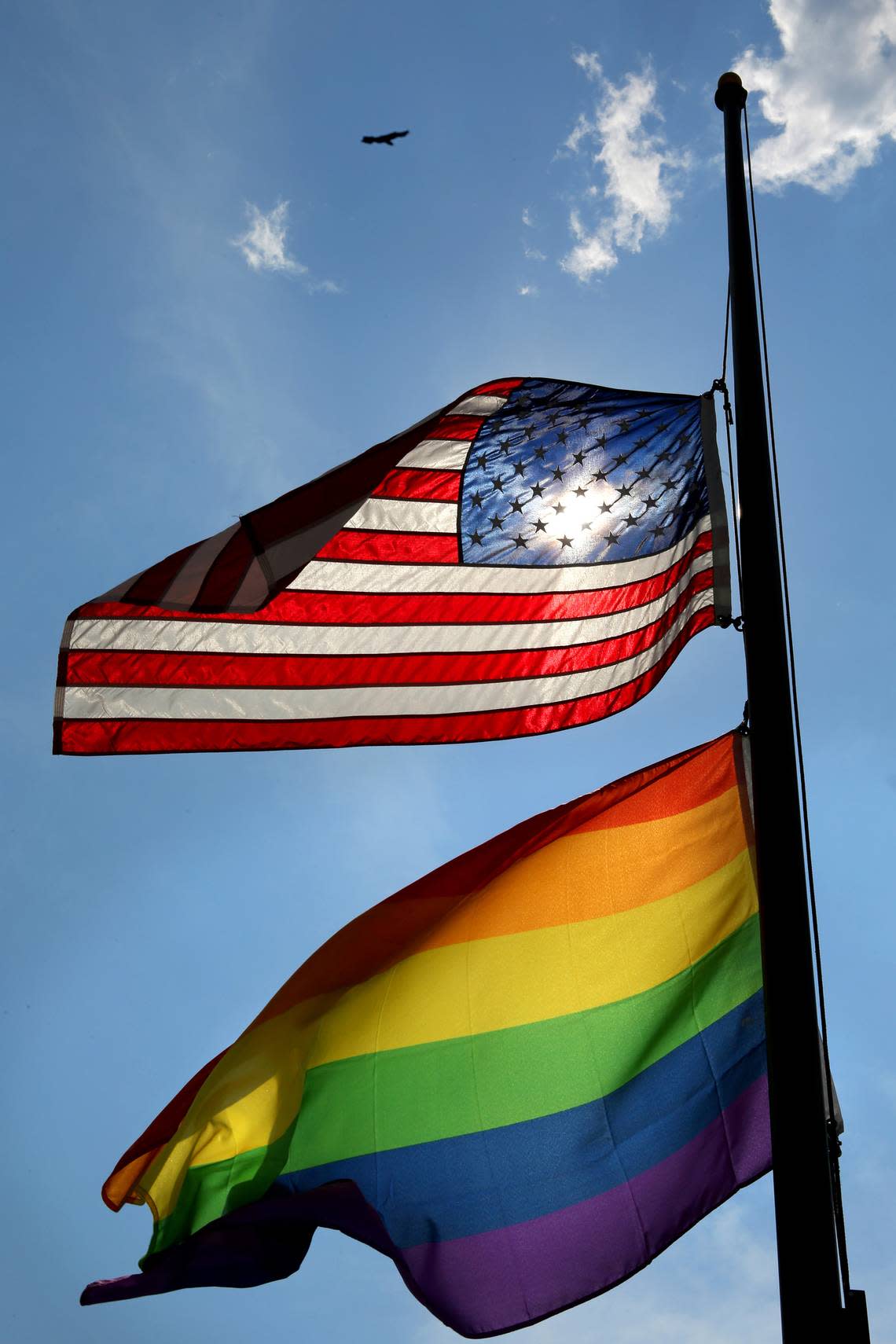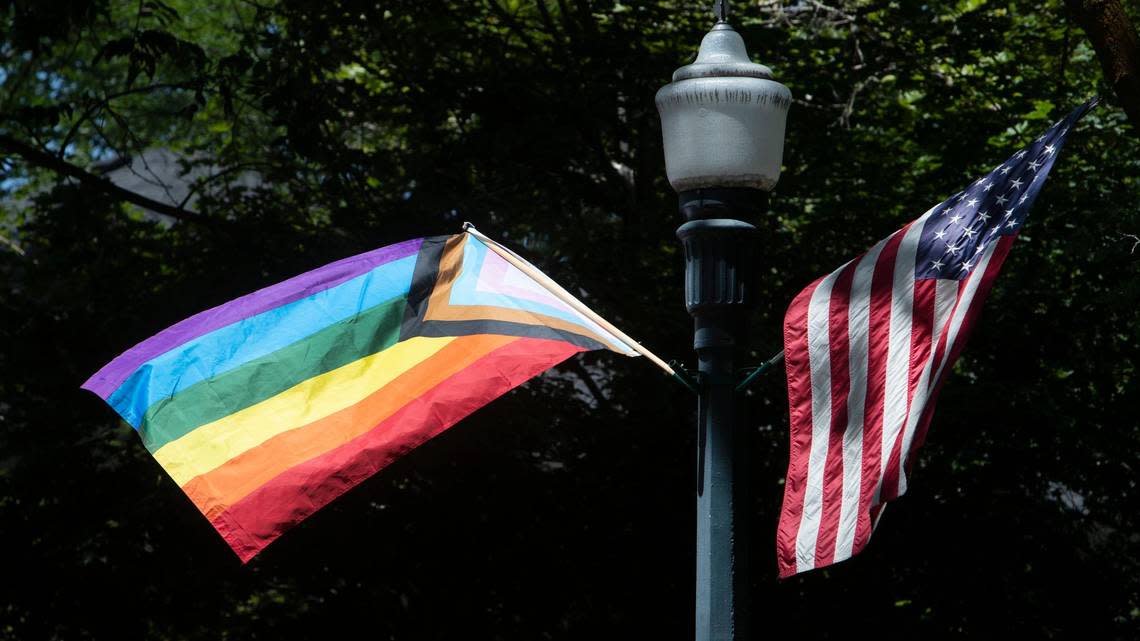Will gay pride and other flags be banned from class? 2 Tri-City boards consider restrictions
Certain types of flags might soon be banned from some Tri-City classrooms.
Two school board members in Kennewick plan on drafting a policy to ban teachers from displaying flags that reflect “controversial issues.” The move would make classrooms more inclusive and welcoming, says board member Micah Valentine. .
“The solution to me is to remove controversial issues that evoke strong, strong emotion. Just remove those from the school so everyone can feel comfortable,” the Kennewick School Board member told the Tri-City Herald. “That’s not the most conducive environment to learn. You don’t need that.”
“We need to have a learning environment that’s free from distraction and free from division, and it needs to be an inclusive environment for every student,” he continued.
The Richland School Board also plans to discuss flags in schools at its Nov. 22 meeting, though it’s unclear if the board is considering a flag ban. No proposal has been made public, though board member Audra Byrd has brought the topic up for discussion.
Valentine said he wants to remove distractions from the classroom that he said would help conservative voters pass the district’s upcoming levy measure.
A ban would likely include flags that promote any “political” or “quasi-political” messages, he told the Tri-City Herald.
That would include rainbow-striped gay pride flags. Valentine said he’s heard some concerns from conservative students about those being “distracting.”
Valentine told his fellow school board members at a meeting last week that passing a conservative school policy would be “essential” to passing the February 2023 levy. Kennewick voters failed twice this year to get a majority to pass its operating levy.
But Carly Coburn, chair of local gay-advocacy group PFLAG Benton Franklin, said recent discussion about banning pride flags has been “very disheartening.”
“I know that pretty much anytime I speak to youth or adults, when they see a pride flag and an LGBTQ pride flag, that they know they’re walking into a safe space and a place where they can be themselves,” Coburn said.

Coburn said their organization has emailed the two school boards about the issue, and said they would be happy to give presentations on the subject of gay representation.
“It’s not just a rainbow. Red stands for life, orange stands for hearing, yellow represents sunlight, green is for nature, blue represents serenity and purple stands for spirit. Those are common areas that I think almost all groups can agree are important things,” they said.
The discussion comes after the Kennewick School Board unanimously passed a policy about “race and the curriculum” this summer. The move was lauded by conservative national news media and groups as “forward-looking,” while others at the school district said it didn’t change anything about how instructors teach their students about history.
Valentine and fellow board member Gabe Galbraith wanted the policy to combat the teaching of CRT, or Critical Race Theory, despite reassurance from Superintendent Traci Pierce and state Superintendent Chris Reykdal that they don’t teach students that college-level theory.
Meanwhile, some members on the Richland School Board say they plan to copy the language from Kennewick’s “race and curriculum” policy and pass it themselves at a future board meeting.
Court decisions
Teachers and students do not shed their First Amendment rights when they enter the classroom, but there are several limitations on teachers, says the ACLU of Washington.
A 1969 U.S. Supreme Court case, Tinker v. Des Moines, guaranteed both students and teachers a right to free speech after a group of Iowa students planned to wear arm bands as a form of anti-war protest during the Vietnam War era.
Still, a flag ban is likely to elicit some pushback from civil rights groups.
Just recently, a judge in Yamhill County, Ore., ruled that policy passed by Newberg School Board members that would have banned Black Lives Matter and LGBTQ+ Pride flags and symbols went against Oregon’s state constitution.

The school board policy was phrased similarly to what Valentine is proposing: A ban on employees from displaying “controversial” or “political” signs or symbols.
Court rulings in recent years have not been clear on how far the government can go in regulating what teachers say in the classroom.
Federal judge in 2008 upheld a policy in New York City that prohibits public school teachers from wearing political buttons in the classes, but said other political activities among teachers — such as placing campaign material into a colleague’s inbox — was acceptable, according to a story in the New York Times at the time.
What are the limits?
Would a ban on political or quasi-political flags or insignias include teachers who display material from their alma mater? Valentine says he hopes not.
“I want people to have Seahawks flags, and WSU flags and UW flags… I hope it doesn’t get too ridiculous where we’re at that point,” he told the Herald.
Valentine argues that the best solution to resolve disputes within the school district about which flags should and shouldn’t be allowed is to just ban them all.
Teachers’ acceptance of students with different political ideologies is best shown in the neutral environment that is reflected in the classroom.
Under a policy drafted by Valentine, he said, Kennewick would allow the use of flags as teaching props on a day-to-day basis that depends on the context of the class subject. Teachers would be able to show the Confederate flag or a progression of how the U.S. flag has changed over time, for example, Valentine said.
The aim is to create an environment that is “free from distraction” and “100% inclusive,” Valentine said.
But removing flags that welcome a safe space to gay kids could create a chilling effect, say some.
Suicide is the second leading cause of death among young people age 10 to 24, and rates among gay and transgender students are more than four times higher when compared with their straight peers, according to the Trevor Project.
Coburn said when gay students know that they have at least one teacher they can turn to, that has the effect of lower depression and anxiety.
“If they know they’re going to be safe talking to them, it could save their life,” they said.
